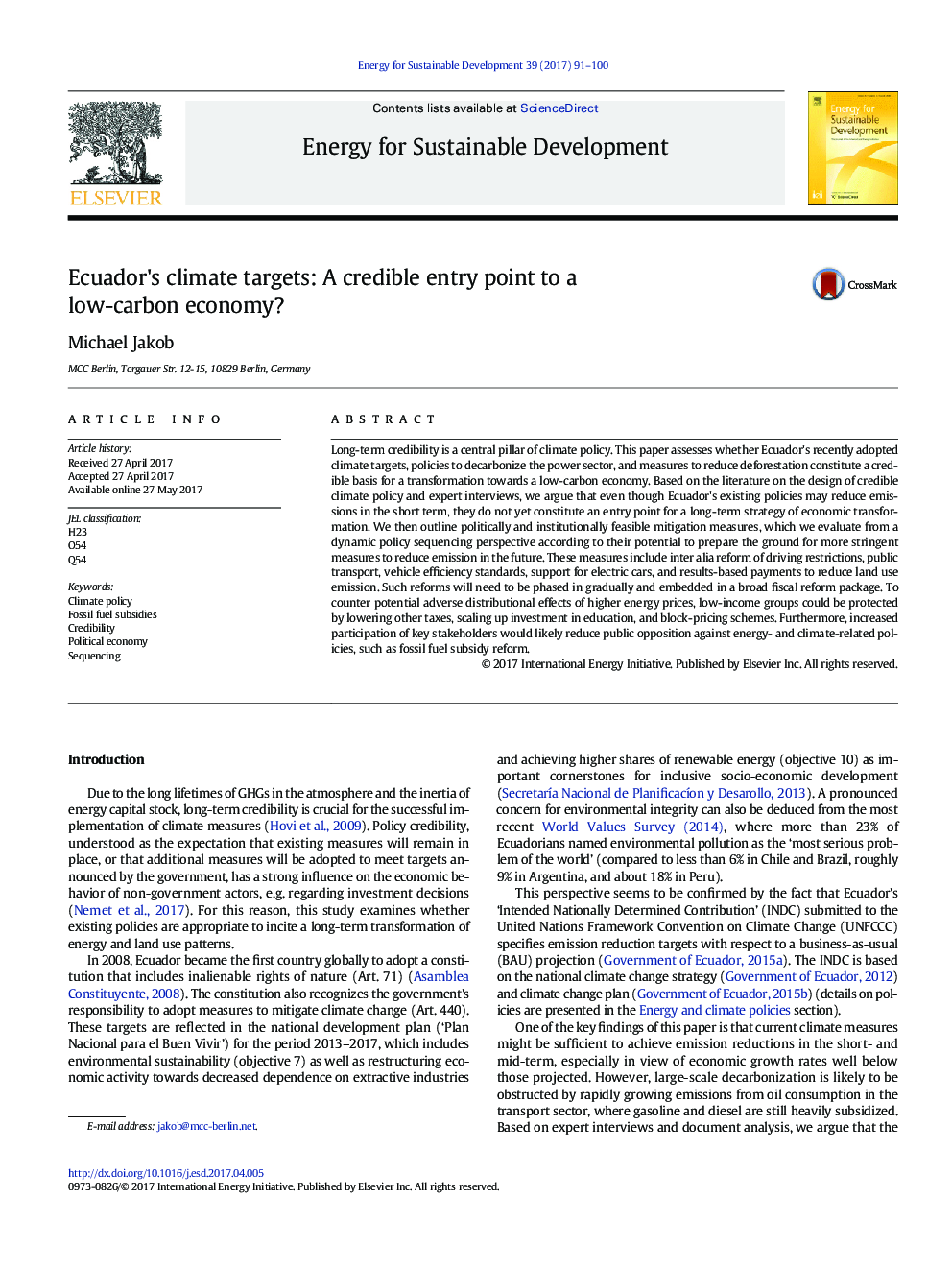| کد مقاله | کد نشریه | سال انتشار | مقاله انگلیسی | نسخه تمام متن |
|---|---|---|---|---|
| 5114359 | 1484391 | 2017 | 10 صفحه PDF | دانلود رایگان |
عنوان انگلیسی مقاله ISI
Ecuador's climate targets: A credible entry point to a low-carbon economy?
ترجمه فارسی عنوان
اهداف اقلیمی اکوادور: یک نقطه ورود معتبر به اقتصاد کم کربن؟
دانلود مقاله + سفارش ترجمه
دانلود مقاله ISI انگلیسی
رایگان برای ایرانیان
کلمات کلیدی
ترجمه چکیده
اعتبار درازمدت یک ستون مرکزی سیاست آب و هوا است. این مقاله به بررسی اینکه آیا اهداف اقلیمی اخیرا اعمال اکوادور، سیاست های مربوط به حذف گازهای سمی در بخش برق و اقدامات کاهش جنگل زدایی، مبنای معتبری برای تبدیل به یک اقتصاد کم کربن است. بر اساس ادبیات مربوط به طراحی سیاست های آب و هوایی معتبر و مصاحبه های متخصص، ما استدلال می کنیم که حتی اگر سیاست های موجود در اکوادور بتوانند در کوتاه مدت به کاهش انتشار گازهای گلخانه ای کمک کنند، هنوز نقطه ورودی برای یک استراتژی بلندمدت تحول اقتصادی نیستند. پس از آن ما اقدامات ضمن مقابله با اقدامات سیاسی و سازمانی را که ما از یک منظر توالی سیاست پویا بر اساس پتانسیل آنها برای آماده سازی زمین برای اقدامات سخت تر برای کاهش انتشار در آینده ارزیابی می کنیم، ارزیابی می کنیم. این اقدامات عبارتند از: اصلاح محدودیت های رانندگی، حمل و نقل عمومی، استانداردهای بهره وری خودرو، حمایت از ماشین های الکتریکی و پرداخت های مبتنی بر نتایج برای کاهش انتشار استفاده از زمین. چنین اصلاحات باید به تدریج به مرحله بعد برسد و در یک بسته اصلاحات مالی جامع قرار گیرد. برای مقابله با احتمال بالقوه اثرات توزیع شده قیمتهای بالای انرژی، گروههای کم درآمد میتوانند از طریق کاهش سایر مالیاتها، افزایش سرمایهگذاری در آموزش و کاهش هزینههای ساختمانی محافظت شوند. علاوه بر این، افزایش مشارکت ذینفعان کلیدی احتمالا مخالفت عمومی را در برابر سیاست های مربوط به انرژی و آب و هوا مانند اصلاح یارانه های سوخت فسیلی کاهش خواهد داد.
موضوعات مرتبط
مهندسی و علوم پایه
مهندسی انرژی
انرژی (عمومی)
چکیده انگلیسی
Long-term credibility is a central pillar of climate policy. This paper assesses whether Ecuador's recently adopted climate targets, policies to decarbonize the power sector, and measures to reduce deforestation constitute a credible basis for a transformation towards a low-carbon economy. Based on the literature on the design of credible climate policy and expert interviews, we argue that even though Ecuador's existing policies may reduce emissions in the short term, they do not yet constitute an entry point for a long-term strategy of economic transformation. We then outline politically and institutionally feasible mitigation measures, which we evaluate from a dynamic policy sequencing perspective according to their potential to prepare the ground for more stringent measures to reduce emission in the future. These measures include inter alia reform of driving restrictions, public transport, vehicle efficiency standards, support for electric cars, and results-based payments to reduce land use emission. Such reforms will need to be phased in gradually and embedded in a broad fiscal reform package. To counter potential adverse distributional effects of higher energy prices, low-income groups could be protected by lowering other taxes, scaling up investment in education, and block-pricing schemes. Furthermore, increased participation of key stakeholders would likely reduce public opposition against energy- and climate-related policies, such as fossil fuel subsidy reform.
ناشر
Database: Elsevier - ScienceDirect (ساینس دایرکت)
Journal: Energy for Sustainable Development - Volume 39, August 2017, Pages 91-100
Journal: Energy for Sustainable Development - Volume 39, August 2017, Pages 91-100
نویسندگان
Michael Jakob,
